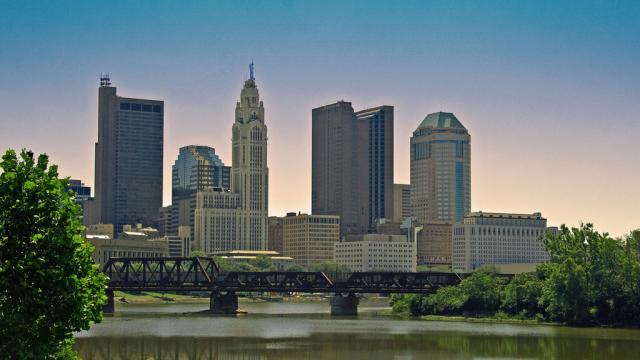Of the seven cities chosen as finalists for the US Department of Transportation’s Smart City Challenge, Columbus, Ohio may have seemed like the underdog. (It was the only finalist that has no rail system whatsoever.) But last week, USDOT announced Columbus as the winner of over $US50 million ($67 million) in cash that will transform its transportation system into one of the most forward-looking in the country.
Image: Flickr / John Mueller
“Columbus was chosen because it put forward an impressive holistic vision for how all its residents can move better and access opportunity,” said Transportation Secretary Anthony Foxx in a call last week.
The announcement (which was scooped by the enthusiastic Ohio Senator Sherrod Brown two days earlier) includes not only the $US40 million ($54 million) originally ponied up by USDOT, but an additional $US10 million ($13 million) from Microsoft founder Paul Allen’s Vulcan Inc., as well as partnerships with Amazon, Mobileye, Autodesk, NXP and Alphabet’s Footpath Labs. In addition to that, Columbus has secured $US90 million ($121 million) more in promised matching funds from local groups. That’s a total of $US140 million ($189 million), which Columbus officials say can go a long way in the city. “This investment will make a difference in our ability to build those ladders of opportunity for the people who need it the most,” said Columbus Mayor Andrew Ginther.
Although Columbus isn’t famous for its transit infrastructure, it’s a good place to try new ideas. As locals are eager to tell you, Columbus is the fastest-growing city in the Midwest, not just in population but in job growth as well. It’s also the city known as “America’s test market” — retailers come to Columbus to try out new products because the demographics and purchasing preferences of its citizens are highly representative of the average American. So what works here will probably work anywhere in the US.
Columbus’s proposal is unique in that it focuses on bringing transportation equity to a specific neighbourhood, Linden, which has a low rate of car ownership and access to digital tools. According to the Columbus Dispatch, the grant might fund a universal transit pass payment system which could work for buses as well as on-demand rides, and be loaded with value using kiosks or smartphones.
In addition to delivering residents to jobs and education through a self-driving EV shuttle system, Columbus also plans to use transportation to improve access to healthcare, namely to address the city’s disturbingly high infant mortality rate which is up to four times the national average in some neighbourhoods. The idea is that getting mums to better prenatal and postnatal care facilities will help more babies reach their first birthdays.
All is not lost for the other six finalists — Austin, Denver, Kansas City, Pittsburgh, Portland and San Francisco — and for the 71 other cities that applied but didn’t make the cut. Most of the finalists have already said they are planning on raising the cash themselves to implement their plans. Vulcan is leading a coalition that will continue to collaborate with the other six finalists on electric vehicle adoption, and publish best practices at a USDOT site so any city can borrow ideas that work.
That’s also the reason why Columbus is the best place for USDOT to put its cash. Columbus will be able to demonstrate how a city which doesn’t have the time or capital to build out a massive rail network can use the next wave of transportation tech — autonomous vehicles, smartphones, sensors — to get residents moving in an efficient way that will get more cars off roads and lower emissions. This solution will have much greater impact as it will be able to help hundreds of smaller cities in the US, not just the handful of bigger cities that grab all the transportation headlines now.
